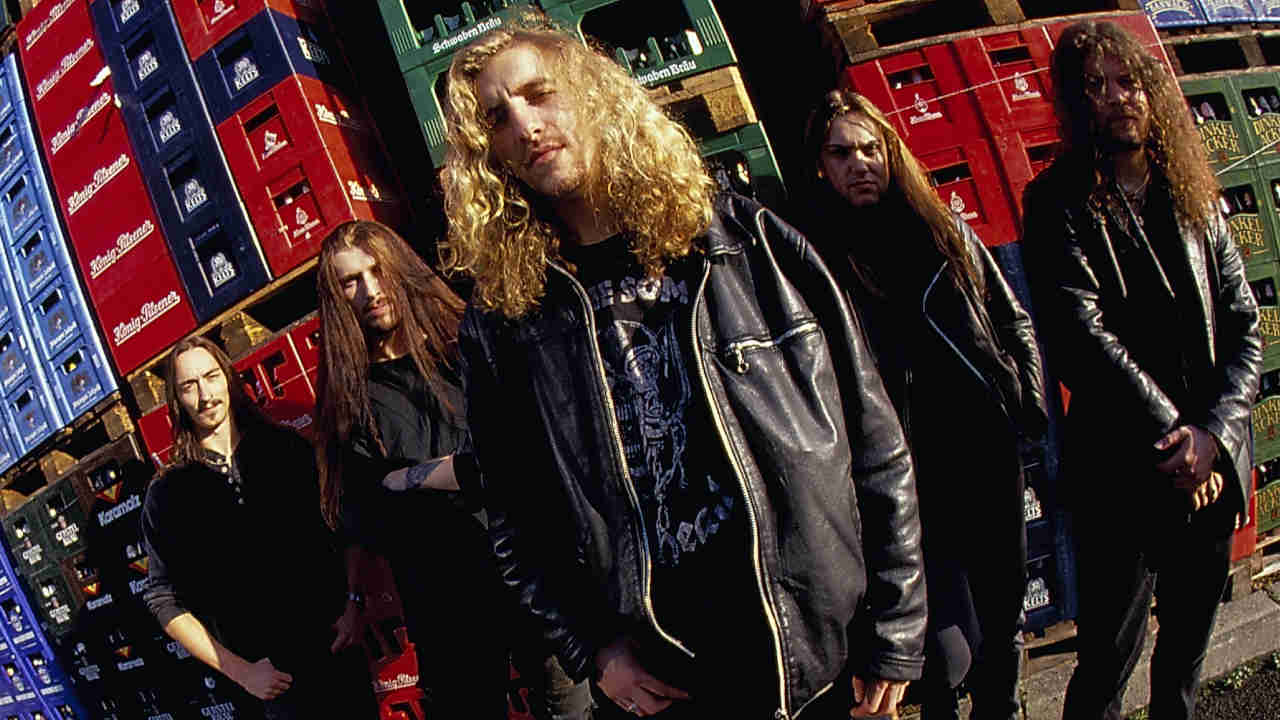Back in the early 90s, Paradise Lost had developed into one of the UK’s most significant underground metal bands. Their relentless work ethic had seen them pen four records in as many years from 1990 to 1993, including classics such as 1991’s Gothic and 1993’s Icon, and the Halifax misery merchants’ crusty doom was reaching into more melodious territories. But by the time they reached 1995, and were ready to start work on their fifth album, Draconian Times, Paradise Lost were feeling burnt out.
“It’s a bit of a blur,” guitarist Gregor Mackintosh tells us today, when we ask him to reflect on the record. “We recorded Icon and then we went on tour with Kreator and Morbid Angel in America. Then we did the Chaos A.D. tour with Sepultura in Europe, and then we were told to record a new album straight away. We hardly got to go home for a few years because it was tour, record, tour, record, and when you’re playing this certain style of music for so long without a break, I defy anyone not to get itchy feet. It’s like working in a factory, albeit a nice factory with free drinks. We needed variation; we needed a shift. It became a little bit of a burnout period.”
Exhausted though they may have been, Paradise Lost went into the studio in early 1995 and created what most fans believe to be their magnum opus. Draconian Times was a record that continued their progression as a band to the point of a full stop, taking their doomy, melancholic sound to the peak of excellence.
- The Story Behind The Song: Rammstein's Du Hast
- The Story Behind The Song: Avenged Sevenfold’s A Little Piece Of Heaven
- The Story Behind The Song: In Flames' Only For The Weak
- The Story Behind The Song: Hearts On Fire by Hammerfall
“Because we had no time off and we were writing on the road, I think of Draconian Times as like the posh version of Icon,” laughs Gregor. “We had taken this new style on during Icon and we perfected it during Draconian Times. We were referencing things like Rush and Queensrÿche as production influences, because we wanted it to sound… almost stadium, if you like. We were thinking about stuff like The Cult, making it as polished and precise as we could.”
With a strong desire to keep pushing their sound forwards, one song would emerge from the album that would come to define everything that made Paradise Lost such an exciting band. Forever Failure retained the doomy, metallic aspects of the past, but had a shimmering, crystal-clear quality and a touch of mystical, shamanic splendour that you can scarcely imagine the early incarnation of Paradise Lost would be capable of.
“The first thing that was written for the song was the solo, which is weird, because that is usually the last thing to come,” Gregor remembers. “We used to write and record on a tape recorder, starting with the riff usually, but I played Nick [Holmes, vocals] this solo and he said it reminded him of a weird little song like ‘I Left A Cake Out In the Rain’ by Richard Harris [the title is MacArthur Park]. If you don’t know it, it’s some odd little folk song from the 60s, and this solo that became Forever Failure had this similar sort of crescendo to it. So, as we wrote the song, he pushed me down that route. I was trying to write this doom metal song and he was pushing me in this more flamboyant direction, which he was doing vocally as well, so it just became this… thing.”
The ‘thing’ that really elevated Forever Failure and made it stand out was the use of a sample from notorious cult leader Charles Manson at both the start and during mid-section, adding to the haunting quality of the song.
“We thought that the breakdown section, the little acoustic bit, needed something in there,” says Gregor. “We had just watched this Charles Manson documentary, The Man Who Killed the Sixties, and there was this really poignant bit where he sums the whole documentary up and we thought that we should use it. I had no idea it was going to be such a ballache to get, but we got it and put it in the song. What we didn’t realise is that, to get that on there, we had to effectively pay the families of his victims royalties from the song. And we’ve been doing that ever since.”
These days such a move would definitely cause outrage but, as Gregor explains, even in the looser days of the mid 90s it caused something of a storm behind the scenes.
“Our manager at the time wasn’t very happy about it,” he tells us. “There was a little bit of dissent here and there but, even with all the red tape, Nick really wanted to use it. To be fair, we couldn’t have used anything else from that documentary because it was all batshit crazy!”

When Draconian Times was released on June 12, 1995, it was immediately hailed as a masterpiece, and the profile of the band soared. The record landed at No.16 in the UK albums chart, a staggering achievement for a group who, only five years prior, were as grim and guttural a doom band as you can imagine.
“In the UK especially, it was pretty shocking for us,” Gregor recalls. “It was quite unobtainable to get that kind of success around that time for a metal band over here. In fact, midweek I believe it was Top 10, and that had a lot of industry insiders going, ‘Wow! A Top 10 metal act!’… even though it didn’t quite make Top 10. It’s not really given the same kudos these days, but back then chart placings really made the big cheeses sit up and take notice, and that can open doors for you; it can get you on tours and on festival bills, which it definitely did for us. It wasn’t just our peak, it was a peak for metal and our industry really. It was the last time that you could get an album that would sell six figures in multiple countries.”
The success of the record turned Paradise Lost into a very big deal indeed. They were soon added to a raft of festival bills across Europe, the most prestigious being the last-ever Monsters Of Rock at Castle Donington alongside the likes of Kiss and Ozzy Osbourne in 1996.
“It was strange, we were kind of mingling backstage with Kiss and it was like, ‘What is this? How did this happen?” laughs Gregor. “Our label, Music For Nations, had set up this tent backstage for us that was just black everything; you could go in and get black beer and black food. It was a gimmick, but it was nice that they had done that for us. The summers of 1995-96 felt like a magical time for, not just us, but our peers as well, people like Type O Negative. Those were some of the biggest festivals in the world and they were mainly for metal bands. It was a real stand-out time; you really have to pinch yourself because you’re just working-class people from the North and there are all these Americans fawning over you.”
Gregor also pinpoints dates supporting the reformed Sex Pistols in 1996 as a personal highlight. “We did a few arenas in Spain with Sex Pistols, Slayer and us,” Gregor smiles. “Weird bill, but thoroughly enjoyable. I had come from the punk scene, more the second wave with stuff like Discharge rather than the Pistols, but still looked up massively to Sex Pistols and Sham 69, so it was quite a thrill. They were just sat around reading books in the catering area, really normal blokes, but then you’d see John Lydon do his press conferences and he’d get into character and be brilliant at winding all these people up. None of it was true, though. They, and Slayer, were just the calmest, nicest bunch you could meet. We were under 30 and, if anyone was the wild bunch on that show, it was us!”
As well as things were going for Paradise Lost, it wasn’t all plain sailing. Ironically for a song so beloved today, Forever Failure was… well, a bit of a flop when it was released; it was the album’s second single, limping to just No.66 on the UK singles chart.
“Our least favourite song on the record is The Last Time, because it’s too jolly, and that got released as a single and sold loads!” sighs Gregor. “So, when we were asked about what song we wanted to release next, we picked Forever Failure and nobody bought it. It had this miserable Schindler’s List-inspired video and we loved it, but somewhere in Europe there is a big stockpile of unsold singles; it just wasn’t what people wanted at that time. It didn’t work as a single, but it is important to us in the band, our fans and within the scene. You aren’t going to get a Top 20 song like Forever Failure.”
Regardless, the song and the album that it came from still continue to inspire today, as the recent 25th anniversary vinyl reissue of Draconian Times proves. “Draconian Times never had a vinyl push; it’s 25 years and the fans seem to want it now,” nods Gregor. “Back then vinyl was being killed off by CD and it might never have even been released on vinyl at all. So, it feels like the right time, it isn’t ever going to happen again. I’m not a ‘regret guy’, but there are a few songs I look back on in our career and think, ‘Why did I do that?’ Forever Failure isn’t one of those songs; I’m still trying to make music like that today. There’s not one thing about that song that I’d change.”

